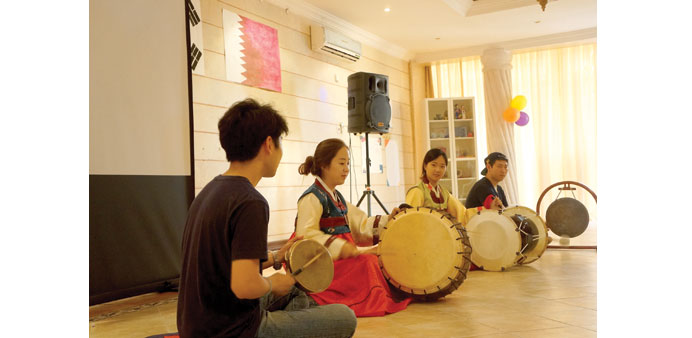Students from South Korea share the best of their country’s culture, both traditional
and contemporary, with their new-found local friends in Qatar. Umer Nangiana
was at hand to see the interaction
Seeing them move to the sensational beats of popular music exclusively associated with their country alone was enough to spark an urge to further explore the culture they were coming from. To add to the curiosity, they did come up with glimpses of their diverse cultural heritage.
Cashing in on the opportunity created by their travel, college and university students from South Korea showcased and shared the best of their country’s culture, both traditional and contemporary, with their new-found local friends in Qatar.
They sang and danced their way to advancing the distinct aspects of their culture such as food, art, music, and entertainment besides their traditional and modern lifestyles. After two consecutive days of activities for cultural exchange between the two ‘friends’, Sarang Plus: Korea Culture Centre here organised a K-pop (Korean popular music and dance) Concert allowing the visiting Korean students to show their musical side.
K-pop is a musical genre originating in South Korea that is characterised by a wide variety of audiovisual elements. The modern form of K-pop covers mostly the dance-pop, pop ballad, electronic, rock, hip-hop, R&B and other genres; however, it traditionally incorporates all popular music genres from within South Korean.
Originating from this East Asian nation, it has spread over to regional countries and other parts of the world so far as parts of Western Europe.
In front of a mix of Qatari and Korean audiences, the young girls and boys performed different formations of the popular dance.
“At the K-pop Concert, we prepared different kinds of performances such as ex-Korean traditional percussion music (Samulnori), K-pop dances and K-pop singing. It was such a special time for us,” said a member of the group of 12 Korean students visiting Qatar on a two-week tour.
While Samulnori, the traditional music from South Korea played with four traditional instruments, including two types of drums and gongs was pleasantly melodious, the highlight of the show remained K-pop.
Dance is an integral part of it. Performed by the students in the groups of four and five, K-pop dances were inadvertently peppy, casting a spell on — and pulling — many in the audience to join the performers.
In some combinations in K-pop, multiple performers sing and dance in synchronized movements that are robust yet alluring. It is popularly called the ‘formation changing’ strategy.
The K-pop dance forms also include ‘point dance’ strategy which is a formation made up of repetitive movements within a choreography. Point dance has become characteristic of K-pops and often includes traditional gestures with hand movements.
Korean students choreographed and practiced dance forms perfectly in sync with the tempo of the music. They would ease into a certain dance form before harmoniously bringing the flow of synchronized movements to an end with the exiting notes of the music.
Both performers and their audience thoroughly enjoyed the show at Sarang Plus. Korean students were excited on seeing Middle Eastern culture and meeting Qatari students. They learnt a great deal about their respective cultures from each other through their interaction at the Korean Culture Centre, said the visiting students.
“We not only exchanged our culture but also had a genuine sharing with each other. We will definitely miss being in Qatar,” Dasom Kim, one of the visiting students told Community.
During the first week of their stay in Qatar, the Korean students went sightseeing in Doha where they were taken to the tours of Museum of Islamic Art (MIA) and the traditional Middle Eastern style market Souq Waqif besides other city attractions such as malls and restaurants.
Initially, their spirits sagged thanks to the hot summer, but the Koreans quickly adjusted and started enjoying their visit. Back at the Sarang Plus, they organised a Korean camp in the first week of their arrival in Doha.
Themed around different activities involving Korean cultural heritage, the camp included Korean Entertainment involving a quiz on Korean dramas and their sound tracks, and a mock Korean Travel Agency where the visiting students gave a presentation on sightseeing places in Korea.
The participants were then asked to make their own travel plans using pointers given by the presenters. The activity was aimed at generating interest in the participants about visiting Korea and exploring its beauty. The students also demonstrated Korean calligraphy done in a traditional way on a thin paper with black ink. There was a session for a cooking class featuring Korean cuisine.
Korean visitors also taught their hosts Yut (Korean traditional monopoly game). It is played on a stitched rectangular board with Yut sticks being used as a dice.
“People who came to our camp told us that they enjoyed their time here. We had a lot of interaction between Koreans and Qataris,” Jay Hong, the Managing Director of Sarang Plus told Community.
Hong said college and university students in Korea normally go out of country during their summer vacation.
These trips are sometimes sponsored by their respective educational institutions or self-sponsored. The purpose is to let them explore other cultures and lifestyles in the world while learning about life outside academics at the same time.

